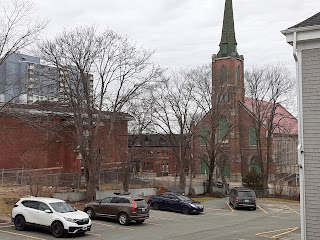The texts from the Roman Catholic Lectionary today invite us to contemplate the action of God in our lives that is associated with our prayer.
The reading from the Book of the Prophet Isaiah praises the success of the Word.
* [55:10–11] The efficacy of the word of God recalls 40:5, 8. (Isaiah, CHAPTER 55, n.d.)
Psalm 34 is praise for Deliverance from Trouble.
* [Psalm 34] A thanksgiving in acrostic form, each line beginning with a successive letter of the Hebrew alphabet. In this Psalm one letter is missing and two are in reverse order. The psalmist, fresh from the experience of being rescued (Ps 34:5, 7), can teach the “poor,” those who are defenseless, to trust in God alone (Ps 34:4, 12). God will make them powerful (Ps 34:5–11) and give them protection (Ps 34:12–22). (Psalms, PSALM 34, n.d.)
The Gospel of Matthew presents the Lord’s Prayer.
* [6:9–13] Matthew’s form of the “Our Father” follows the liturgical tradition of his church. Luke’s less developed form also represents the liturgical tradition known to him, but it is probably closer than Matthew’s to the original words of Jesus. (Matthew, CHAPTER 6, n.d.)
Julie Kalkowski comments that teaching us to pray is yet another example of how much our God loves us. Being well acquainted with our human frailties, God constructed a prayer that would help us move beyond our earthly fears and doubts so we are able to see and respond to our neighbors in need. The more she has pondered this prayer the last few days, the more she has become captivated by its simplicity and power in each line.
Our Father who art in heaven,:
This line grounds us and reminds us who we are and whom we belong to.
hallowed be thy name,:
God’s name is holy, sacred…remember that.
thy Kingdom come,
thy will be done,
on earth as it is in heaven.
God is planting the seed that our communities and our world can, one day, become more like God’s kingdom.
Give us this day our daily bread;
We are being given permission to ask for what we need whether its food or some other need or request for help.
and forgive us our trespasses,
as we forgive those who trespass against us;
The older I get, the more I have come to understand the power of forgiveness. One of my favorite lines from The Color Purple by Alice Walker is that “Meanness kills.” It not only harms other people, it also hurts us. Holding on to grudges and clinging to past hurts diminishes the quality of our lives along with our capacity for compassion. How can we help God’s kingdom come if we can’t forgive ourselves and each other?
and lead us not into temptation,
but deliver us from evil.
God is encouraging us to stay to course—to pursue building God’s kingdom in the here and now. Don’t get sidetracked by others or by your own desires. (Kalkowski, 2023)
Don Schwager quotes “Pardon your brother and sister,” by Augustine, Bishop of Hippo, 354-430 A.D.
"Pardon, that you may be pardoned. In doing this, nothing is required of the body. It is the will that acts. You will experience no physical pain - you will have nothing less in your home. Now in truth, my brothers and sisters, you see what an evil it is that those who have been commanded to love even their enemy do not pardon a penitent brother or sister." (quote from Sermon 210,10) (Schwager, n.d.)
The Word Among Us Meditation on Matthew 6:7-15 comments that rather than give us a specific set of instructions, Jesus taught us a way to pray that both reveals God’s heart to us and invites us to attune our hearts to his (Matthew 6:7-15).
Today, pray the Our Father slowly. With each petition, think about how it reveals God’s heart. Don’t worry if you are praying “correctly.” Just praise God with all your heart for his never-ending love, compassion, and mercy for you!
“Jesus, may my prayer today lead me to the heart of the Father.” (Meditation on Matthew 6:7-15, n.d.)
Friar Jude Winkler comments on the Hebrew understanding of the power of the word to make people and events present in more than a symbolic representation. The more refined liturgical nature of the Lord’s prayer in Matthew is compared to the disjointed intercessions in Luke that may be closer to Jesus prayer. Friar Jude reminds us that forgiveness requires an open heart that recognizes the different gifts of the children of God.
Barbara Holmes reminds us of the forgotten gifts of early Christianity, particularly from its African legacies.
This desert may initially seem barren, dull, and colorless, but eventually our perceptions start to change…. Here we empty ourselves of our own obstacles to God. In the space of this emptiness, we encounter the enormity of God’s presence…. The ammas [Desert Mothers] teach us that the desert becomes the place of a mature repentance and conversion toward transformation into true radical freedom. [1]
We are in need of those values central to African monasticism and early Christian hospitality; they include communal relationships, humility, and compassion. Laura Swan sums up these virtues in the word apatheia, defined as “a mature mindfulness, a grounded sensitivity, and a keen attention to one’s inner world as well as to the world in which one has journeyed.” [2] Inevitably, the journey takes each of us in different directions; however, by virtue of circumstances or choice, each of us will at some point in our lives find ourselves on the outskirts of society listening to the silence coming from within. During these times, we realize that contemplation is a destination as well as a practice. (Holmes, 2023)
We can invoke the Spirit to lead us to the time and manner of prayer that we most need for our particular circumstances.
References
Holmes, B. (2023, February 28). Recognizing Our Lost History — Center for Action and Contemplation. Center for Action and Contemplation. Retrieved February 28, 2023, from https://cac.org/daily-meditations/recognizing-our-lost-history-2023-02-28/
Isaiah, CHAPTER 55. (n.d.). USCCB. Retrieved February 28, 2023, from https://bible.usccb.org/bible/isaiah/55?10
Kalkowski, J. (2023, February 28). Creighton U. Daily Reflection. Online Ministries. Retrieved February 28, 2023, from https://onlineministries.creighton.edu/CollaborativeMinistry/022823.html
Matthew, CHAPTER 6. (n.d.). USCCB. Retrieved February 28, 2023, from https://bible.usccb.org/bible/matthew/6?
Meditation on Matthew 6:7-15. (n.d.). The Word Among Us: Homepage. Retrieved February 28, 2023, from https://wau.org/meditations/2023/02/28/619984/
Psalms, PSALM 34. (n.d.). USCCB. Retrieved February 28, 2023, from https://bible.usccb.org/bible/psalms/34?4
Schwager, D. (n.d.). Your Heavenly Father Knows What You Need. Daily Scripture Readings and Meditations – Daily Scripture Readings and Meditations. Retrieved February 28, 2023, from https://www.dailyscripture.net/daily-meditation/?ds_year=2023&date=feb28

